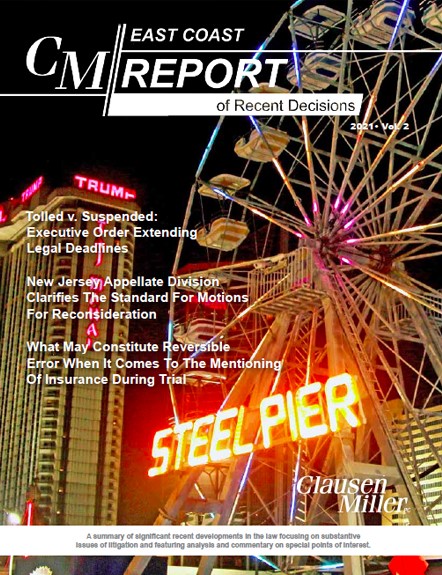East Coast CM Report of Recent Decisions – 2021 Volume 2

Tolled Versus Suspended, The Second Department Interprets Governor Cuomo’s Executive Order Extending Legal Deadlines
As a result of the COVID-19 pandemic, New York State Governor Andrew Cuomo issued a number of Executive Orders that had a wide ranging effect on the legal system and certainly on the society at large. The flurry of Executive Orders included directives such as the declaration of a Disaster Emergency in the State of New York, EO 202; or EO 202.1 which allowed a bevy of action, including allowing hospitals to exceed maximum patient capacity, allowing over the phone diagnosis of patients and allowing temporary hospitals to be established, to name a few.
Federal Appeals Court Finds That Entitlement To Indemnification Requires “Unmistakable Intent” Under New York Law
The Second Circuit Court of Appeals affirmed the judgment of the Western District, finding that by the terms of the relevant contractual agreements, Plaintiff Firemen’s Insurance Co. owed no duty to defend and indemnify Defendant Story. Firemen’s Ins. Co. v. Story, 2021 U.S. App. LEXIS 15852 (2d Cir. 2021).
New Jersey Appellate Division Clarifies The Standard For Motions For Reconsideration
In Lawson v. Dewar, 2021 N.J. Super. LEXIS 69, the Appellate Division provided distinctions between motions seeking reconsideration of final orders and motions seeking reconsideration of interlocutory orders.
The Relationship Of Reimbursement To Subrogation Under Federal ERISA Regulations And Common Law Equitable Principles
In Freitas v. Geisinger Health Plan, No. 4:20-CV-01236, 2021 U.S. Dist. LEXIS 100325 [M.D. Pa. May 27, 2021], the United States District Court for the Middle District of Pennsylvania denied Defendant Geisinger Health Plan’s (“Geisinger”) motion to dismiss Plaintiffs Lori Freitas and Kaylee McWilliams’ (“Plaintiffs”) claims, pursuant to Federal Rule of Civil Procedure 12(b)(6) for failure to state a claim upon which relief can be granted. Defendant Geisinger, an employee welfare benefits plan governed by ERISA, sought reimbursement under the plan’s subrogation clause from plan participants Plaintiffs for Defendant’s payments to Plaintiffs under the plan. The Court denied Defendant’s motion because the plan did not specifically include a reimbursement provision requiring a member to reimburse the plan for benefits paid if the member receives compensation from a third-party tortfeasor who injures her.
First Department Further Clarifies On What May Constitute Reversible Error When It Comes To The Mentioning Of Insurance During Trial
The purpose of a trial is to win, whether it is Plaintiffs going after monetary compensation or Defendants going for full dismissal of the case. Attorneys will try to present the facts in the most favorable way in front of a jury. Plaintiff’s counsel will often attack the credibility of Defendant’s witnesses and Defendant’s counsel will often highlight Plaintiff’s own fault. The jury is tasked to weigh all the evidence presented and decide the outcome of the trial. The jury will be given instructions to help guide them through complex fact patterns and legal standards both before and during the trial. These instructions or the lack thereof may sway the outcome of a trial; thus, failure to instruct the jury properly will result in mistrial.
New Jersey Employers Required To Reimburse Injured Workers’ Costs Of Medical Marijuana
The Supreme Court of New Jersey recently upheld a Workers’ Compensation Court Order requiring an employer to reimburse ongoing costs of medical marijuana prescribed after a work-related injury. In Hager v. M&K Construction, 2021 LEXIS 332 (N.J. April 13, 2021), Plaintiff Vincent Hager suffered a back injury while working for Defendant M&K Construction (“M&K”) in 2001. Hager underwent surgical procedures and continued with opioid medication for chronic pain, but this was not successful. In 2016, Hager’s treating physician enrolled him in New Jersey’s medical marijuana program, both as a means of pain management and to overcome an opioid addiction. Hager sought reimbursement for his $600/month medical marijuana expenses, and the trial court granted this along with a permanent partial disability rating to his spine.
 Private: Robert A. Stern
Private: Robert A. Stern Private: Grace Guo
Private: Grace Guo Marisa G. Michaelsen
Marisa G. Michaelsen Private: Douglas M. Allen
Private: Douglas M. Allen Private: Alexandra DiFusco
Private: Alexandra DiFusco Private: Veronica Abraham
Private: Veronica Abraham Djordje (George) Caran
Djordje (George) Caran